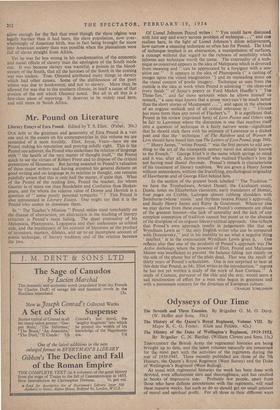Mr. Pound on Literature
Literary Essays of Ezra Pound. Edited by T. S. Eliot. (Faber. 30s.)
OUR debt to the greatness and generosity of Ezra Pound is a vast one and in the essays on his contemporaries in this volume we are reminded of it most forcibly. Eliot, Joyce, Yeats—here we see Pound staking his reputation and proving solidly right. This is the Pound one admires, the Pound who underlines the relation of language with " the health of the very matter of thought itself," the Pound quick to see the virtues of Robert Frost and to dispose of the critical pretensions of Housman. But having assented to Pound's valuation of three major writers and having accepted his general dictums on good writing and on language in its relation to thought, one remains painfully aware that this is only half the matter, if quite that. What of the Pound of the reading lists, Pound the teacher, for whom Gautier is of more use than Baudelaire and Confucius than Shakes- peare, and for whom the relative value of Donne and Herrick is a question of " some purely personal sympathy " ? This Pound is also represented in Literary Essays. One might say that it is the Pound who comes to dominate them.
In " The Teacher's Mission " Pound writes most trenchantly on the disease of abstraction, yet abstraction in the teaching of literary criticism is Pound's main failing. The sheer externality of his Melopoeia, Phanopoeia, Logopoeia and their uselessness as critical aids, and the inadequacy of his account of literature as the product of inventors, masters, diluters, add up to an incomplete account of poetic technique, of literary tradition and of the relation between the two. Of Lionel Johnson Pound writes : " You could have discussed with him any and every serious problem of technique ..." and one realises here, in the light of Lionel Johnson's dilute achievement, how narrow a meaning technique so often has for Pound. The kind of technique implied is an abstraction, a manipulation of surfaces, a concept without due regard to the richness of sensibility which informs any technique worth the name. The externality of a tech- nique so conceived appears in the idea of Melopoeia which is divorced from meaning and " can be appreciated by a foreigner with a sen-
sitive ear." It appears in the idea of PhanQpoeia (" a casting of images upon the visual imagination ") and its misleading stress on the visual content of poetic imagery. Technique as seen from the outside is the idea at work when Pound is admiring " the clean-cut ivory finish " of Joyce's poetry or Ford Madox Hueffer's " The Three-Ten," and far more seriously when he allows himself to remark, "a sane man knows that a prose story can't be much better than the short stories of Maupassant ...", and again in the absence of an organic outlook and of all critical relevance in : " Ulysses has more form than any novel of Flaubert's." It is significant that Pound in his review (reprinted here) of Lore Poems and Others can be fair to Lawrence where the discussion is one that resolves itself into a question of technique in a fairly narrow sense—significant that he should stick there with his estimate of Lawrence as a dialect poet and that the ' technique ' of The Rainbow and of Women in Love should have bored him (see The Letters of Ezra Pound, page 394).
" Henry James," writes Pound, " was the first person to add any- thing to the art of the nineteenth century novel not already known to the French." George Eliot's is the name which springs to mind and it was, after all, James himself who realised•Flaubert's loss in not having read Daniel Deronda. Pound's remark is characteristic of his treatment of literary tradition. We are given a Henry James without antecedents, without the fructifying, psychological originality of Hawthorne and of George Eliot behind him.
In the section of the present book labelled " The Tradition " we have the Troubadours, Arnaut Daniel, the Cavalcanti essay, Dante, notes on Elizabethan classicists, early translators of Homer, four pages on Crabbe, Laforgue almost rubbing shoulders with Swinburne (whose music ' and rhythms receive Pound's approval), and finally Henry James and Remy de Gourmont. Whatever else we may derive from these essays—and Pound's comments are often of the greatest interest—the lack of centrality and the lack of any complete conception of tradition cannot but point us to the absence of the discipline of an organic literary-critical approach. One reflects that Pound's own approach results in judgements like that on Wyndham Lewis as " the only English writer who can be compared with Dostoievsky," and in his inability to see what a negative thing
' intellect ' is in• the connotation Wyndham Lewis gives it. One reflects also that one of the products of Pound's approach was The Active Anthology, where the presence of Eliot, Pound and Marianne Moore was insufficient to prevent the balance falling not merely on the side of the phony but of the plain dead. That was the result of thirty years of Pound's eclecticism. One is not surprised to hear at this date that Pound, as Mr. Eliot writes in the introduction, " regrets he has not yet written a study of the work of Jean Cocteau." A study of Cocteau, purveyor of the chic and the arty, would, seem a sad misdirection of effort for a man who began in greatness and with a passionate concern for the direction of European culture.
CHARLES TOMLINSON


































 Previous page
Previous page